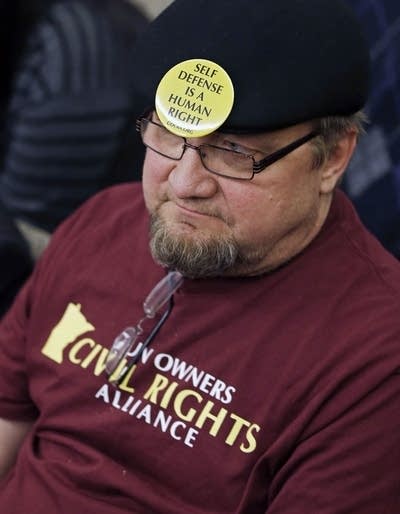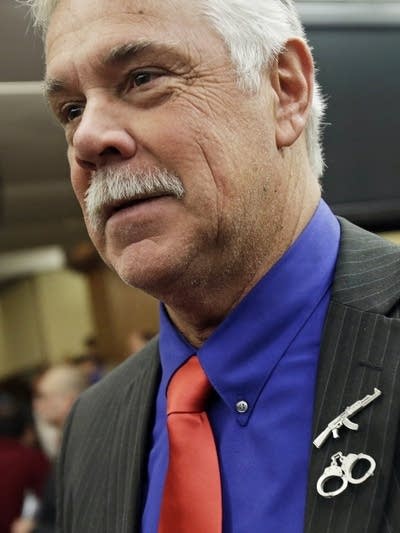Gun control hearings at Capitol will not include the most controversial proposals

A second round of gun control hearings at the state Capitol starting Thursday will not include discussion of the most controversial proposals, says a state legislator.
The chair of the Senate Judiciary Committee, DFL Sen. Ron Latz, said his committee will not consider any proposals to ban assault-style weapons and high-capacity ammunition magazines.
Earlier this month, hundreds of people listened to passionate testimony arguing for and against several bills aimed at curbing gun violence. Some legislators say they now want to focus on proposals that are less polarizing and have the most potential to become law.
"It's clearly a highly emotional and divisive topic — those two in particular," Latz said. "I'm trying, as committee chair, to find solutions that have a bit more consensus around them."
Create a More Connected Minnesota
MPR News is your trusted resource for the news you need. With your support, MPR News brings accessible, courageous journalism and authentic conversation to everyone - free of paywalls and barriers. Your gift makes a difference.
Latz refers to a House proposal which redefines what an assault weapon is and would prevent the import and sale of the firearms. Under the bill, people who already own an assault-style weapon would have to essentially register the gun or destroy it.
The proposal concerns people like Kevin Seifken of Albert Lea. Seifken said he inherited his dad's .22-caliber Marlin rifle. The gun has a fixed ammunition magazine which can hold more than seven rounds, making it an assault weapon under the new definition. Seifken says the gun is small, and looks more like a BB gun than a military-style weapon.
"I suppose you could shoot squirrels, things like that. If you had a skunk on your property, it's kind of handy for that sort of thing," Seifken said.
"We have more issues with straw purchasing here in the Midwest. We have guns being purchased locally and getting into the hands of people who shouldn't have them."
Under the bill, Seifken would also be prohibited from transferring the rifle to anyone else in his family. Seifken, who considers himself a Democrat, said that provision goes too far. Lawmakers need to use common sense when responding to problems like gun violence, he said.
"They need to be very careful when they are trying to prevent these things, that they are just looking at the issues of prevention and they aren't going a step too far," Seifken said.
At last count, Latz said, nine to 10 gun-related bills are scheduled for discussion during the hearings. The bills are similar to legislation offered by House lawmakers and include measures to extend background checks to nearly all firearms sales and improve efforts to keep firearms away from people who are mentally ill and dangerous.
Most people support these kinds of measures, Latz said. He said he has read polls that show more than 80 percent of Americans are in favor of universal background checks. However, the Senate background check bill will likely face opposition during the hearings.
At the committee hearing earlier this month, gun rights activists criticized the House version of the bill. Hamline University law professor Joseph Olson told the committee he opposed the requirement that all private sales be conducted through a licensed firearms dealer. Under the law, a private person who wants to sell a gun to another private person must first transfer the gun to a federally licensed dealer who conducts the background check. After the background check is completed the dealer can transfer the gun to the buyer.
"The federally licensed dealer has to treat the sale as if he was making it, which means that you have all of the paperwork, the 4473 as we call it, which will be filled out. Which is kept forever," Olson said.
Olson said a copy of the 4473 — the form that documents the sale transaction — is kept on file with the Bureau of Alcohol Tobacco Firearms and Explosives, even after the gun dealer closes his or her business. He said the collection of forms with the names of gun buyers constitutes a registry. Olson worries that registry could be used by the government as a means to confiscate firearms.
Officials with the ATF national tracing center in West Virginia said they are forbidden by law from creating a searchable database of gun buyers. The forms are photographed and kept on microfilm.

The Senate hearings will also include discussion of legislation imposing tougher penalties on straw buyers — people who buy firearms for those who are legally prohibited from possessing them. Former Minneapolis police chief Tim Dolan supports that legislation because he said straw sales are a common way for criminals to get firearms in Minnesota.
"We have more issues with straw purchasing here in the Midwest," Dolan said. "We have guns being purchased locally and getting into the hands of people who shouldn't have them."
Due to popular demand, Senate officials say people who want to observe the hearings must obtain tickets for a seat in the hearing room. For those who cannot get into the hearing, there will be two overflow rooms where people will be able to see and hear the discussion, which take place from noon to 2:30 p.m. today. No votes will be taken on the measures this week, Latz said.


